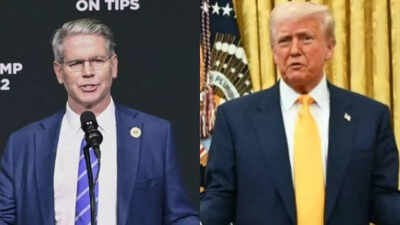
A growing split in US economic messaging is evident, as Treasury Secretary
Scott Bessent
’s call for international cooperation collided with president
Trump
’s renewed threats of trade tariffs and a hardline message from the White House press room.
Speaking at the Institute of International Finance, Bessent reassured investors that the US remained committed to its global leadership role, even while levelling sharp criticism at the International Monetary Fund and the World Bank for drifting from their core mandates. “America first does not mean America alone,” Bessent said. “It is a call for deeper collaboration and mutual respect among trade partners.”
But any attempt at tempering international unease was quickly overshadowed by a firm statement from the White House. US press Secretary
Karoline Leavitt
told Fox News on Wednesday that “there will be no unilateral reduction in tariffs against China,” effectively closing the door on speculation sparked by president Trump himself.
Trump had floated the idea that the administration's sweeping 145% tariffs on Chinese goods could “come down substantially,” raising hopes of a thaw in trade tensions. But Leavitt made clear that tariffs will remain in place unless Beijing agrees to a new deal. “The president has made it clear China needs to make a significant deal with the United States of America,” she said. “And we are optimistic that will happen.”
Bessent, a former hedge fund manager, has been attempting to walk a delicate line between Trump’s protectionist instincts and the need for global financial stability. While not backing a full withdrawal from the IMF or World Bank—a policy floated in the Heritage Foundation’s Project 2025—he criticised both institutions for “mission creep” and prioritising issues like climate change and gender equality over economic fundamentals.
Even as he called for reform,
Bessent
’s tone marked a departure from the more radical elements of Trump’s economic policy. He acknowledged the importance of multilateral institutions in fostering stability and hinted at the possibility of a recalibrated relationship with China. “There is an opportunity for a big deal here,” he said, suggesting mutual economic rebalancing—more US manufacturing and increased Chinese consumption.
The confusion surrounding trade policy reflects a broader challenge within the administration: reconciling nationalist economic policies with a desire to project financial leadership abroad. For development bankers and global markets, Bessent’s speech may have brought some relief—but Leavitt’s blunt message was a reminder that the White House remains committed to a confrontational approach.

 4 weeks ago
65
4 weeks ago
65




























 English (US)
English (US)